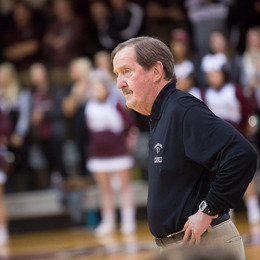
As a boy growing up in West Philadelphia, Herb Magee wanted nothing more than to make the basketball team at West Catholic High School. He was on the smaller side, so he knew he had to outwork—and outshoot—his opponents. His devotion to honing his skills ultimately helped him make the team at West Catholic, and his life took off from there.
After four years as a standout player for the Philadelphia College of Textiles and Science (now Philadelphia University)—he scored more than 2,200 points, long before the three-point line existed—Magee was drafted by the Boston Celtics, which at the time was perhaps the most dominant team in the National Basketball Association. He would never step onto the NBA hardwood, however. He had broken two fingers on his shooting hand just prior to training camp, so he opted not to attend. Instead he pursued a different path that would enable him to stay close to the game he loved. He became a coach.
In his 48 years as head coach of the men’s basketball team at Philadelphia University, Magee has amassed a storybook career. His team won the NCAA Division II championship in 1970, just his third year as coach. He has been honored by too many organizations to count, with inductions into the Naismith Memorial Basketball Hall of Fame and the Philadelphia Sports Hall of Fame. He is among the winningest coaches in the history of college basketball, having earned his 1,000th victory in early February.
The same skill that made him such a coveted player in his youth—a great shot—earned him a nickname: the Shot Doctor. To this day basketball players of all ages and skill levels turn to him for self-improvement, including at a summertime basketball camp for boys and. Now in its 21st year, the camp will be held this June 29 to July 3 at Great Valley High School in Malvern.
We caught up with Magee, who lives in Berwyn, to talk about his time as a coach and a player, the secret to a perfect free throw and why “the ultimate game” is about much more than putting a ball through a hoop.
You don’t achieve such a high level of success without the combination of time and talent. To what do you attribute all that you have accomplished in your career?
When you’re recruiting for a university, you’d better have something to recruit for; it’s not just having a scholarship for a kid to play basketball. Philadelphia University is a great place. The academics are solid and strong, and the history of the basketball program is excellent. If a kid is not being [inundated] by Division I offers, we’ve got a good chance of getting him. Our reputation is really high, and it’s the main reason we’ve been able to attract quality players over the years. I consider myself a good judge of talent and character, and I’ll spend a lot of time researching a young man, not only to see if he can play basketball but also to see what kind of kid he is—his demeanor, his body language, how he deals with losing the game, dealing with teammates. The best attribute you can have is to be a good teammate. It’s important to have guys who can play, but if you’ve got guys that are good teammates, you’re going to have a successful year. All coaches consider themselves a teacher first, and I pride myself on teaching the game the way it should be played—playing the right way and teaching the kids to believe in themselves. It’s not just the strategy of the X’s and O’s.
Putting a ball into a hoop seems like such a simple act, yet if it were we’d all be professional basketball players. What skills have you mastered that make you the so-called Shot Doctor?
I taught myself; I used to go to Warriors games and watch the NBA guys. You would pay $1 to get in and sit down, and then we’d sneak down and watch them courtside to see how they were shooting. I was always experimenting. I practiced every day, shooting the basketball over and over again. What I do now is teach the way I shoot, and my belief is there’s only one way to do it. If you watch guys who are really good at three-point shooting, watch their release. They’re all a little different but they’re all the same—gripping the ball correctly, releasing it correctly. And so much of it is psychological.
With so much success in your career, how do you maintain your motivation, your desire to continually improve?
I don’t know. It’s my background. Growing up in West Philly, basketball was the game. I spent hours and hours working just to be on the team. … Even now, when we’re not practicing or playing, I’ll turn on the TV and watch part of the Sixers game or whatever college games are on. I love watching the game. I’m intrigued about the way teams play, and I’m constantly learning about the game of basketball. … Basketball is the ultimate game, just guys playing five on five, with and against each other. The No. 1 skill in the game is shooting, but you also have to be able to win games if you’re not [shooting well], and that’s why defense is so important. When I’m recruiting, I’m looking at, No. 1, his ability to shoot and, No. 2, his ability to be better.
Photograph courtesy of Philadelphia University


